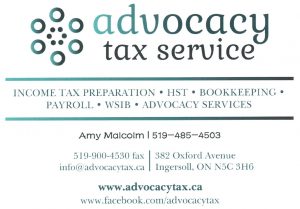As we near the end of funding available to deliver the Self Employment Training (SET) program, we are reflecting on some of the successes over the past year. The program was a special project funded by the Federal Economic Development Agency of Southern Ontario (FedDev). The training will be delivered twice more before the program ends in March 2019. If you’re interested in the program, we encourage you to register as soon as possible. You can learn more about the program including upcoming training dates and registration here.
Meet Amy, owner of Advocacy Tax Service in Ingersoll, Ontario
Amy graduated from Fanshawe’s Law Clerk program with Honours in 2011. Working in the tax and financial industry for the last five years, she has used her legal knowledge in understanding CRA and the laws around financial obligations to allow her to advocate and support others. She is always looking to learn so she is currently working towards her Distinguished Financial Advisor – Tax Service Specialist designation.
After deciding she wanted a change, she explored self employment through the SET program. In June 2018, she opened Advocacy Tax Service.
“I had a great time in the SET ONE program. I was able to attend at a time when I was at a major crossroads and in need of a change. I feel that the program offered me some very valuable insight on ways to run my business that set me up to be more successful in the long run. I was so grateful to have to dissect my business plan and look at the full scope of my vision. It was a very relaxed atmosphere, excellent facilitators and lots of other participants who were able to educate the group with their specific knowledge and expertise. I would HIGHLY recommend any of the amazing services that Community Futures Oxford have. They are an invaluable resource in our community!”
-Amy Malcolm, SET ONE participant
We asked Amy if she could share some helpful tips for small business owners. Here are Amy’s 3 Helpful Tips to Keep in Mind Year Round (keeping and eye on your books isn’t just for tax season, folks!)
- Be compliant! Whether you are filing your personal income tax or are a business owner and HST registrant with payroll – know your filing dates. A lot of people think that if they aren’t able, in the moment, to meet their financial obligations for remittance that they are better to not file. Nothing could be further from the truth. CRA, HST, WSIB – any agency really – is going to be willing to work with people that deal with the situation more than those who sweep things under the rug and avoid them. Being compliant eliminates late filing penalties as well. So, instead of paying penalty and interest, file on time and save yourself some of your hard-earned dollars.
- Know the credits, benefits and deductions available to you. These things are broad in nature, but your situation is specific. Basing what you think should be the outcome of your tax return on the guy from work or the lady down the street that looks like she makes the same kind of income or pays the same amount of property tax is one of the biggest mistakes you can make. The dynamics of each person/household can be so different. Maybe your co-worker has a disabled child and perhaps the lady down the street goes to school full or part time. If you are worried about your tax standing, check in with your preparer and they can calculate where your income level is falling and that you are having enough tax withheld by your employer (or if you are self-employed, you can make sure that you are holding back enough money to cover anything you may owe). Knowing what tax bracket you are in and if deductions like RRSPs will help you can make a tremendous difference. Alternately, if you aren’t in a taxable position or have a good pension, putting money into RRSPs is not necessarily in your best interest.
- Communication is key! Update your tax preparer on any changes in your life. CRA benefit programs are income sensitive. A change in the family dynamic can leave you owing money back or an increase in benefit dollars you aren’t receiving if not reported promptly. Common-law, marriage, separation, children coming into or leaving your care can make a big difference! Common-law is a complicated and often confusing topic as there are so many definitions for CRA, insurance, family law, benefits through employment – they all have different criteria. For CRA, common-law is when 2 people cohabitate as part of a relationship for 12 consecutive months or have a shared (biological or adopted) child together (whichever comes first). For example, if you are living together for five months and you have a child in month six, you are now effectively common-law, and you need to have your benefits recalculated so you should let CRA know immediately. If you separate from a spouse or common-law spouse, you need to notify CRA after 90 days so that they can recalculate any shared benefits to individual benefits.
To discuss your tax needs with Amy, feel free to contact her at:
